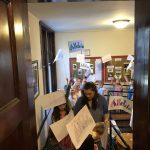Last Sunday, in preaching about Luke’s story of two disciples on the road to Emmaus, I concluded the sermon with a poem. Several of you asked about the source of the poem and for a copy of it.
I composed the poem a few years ago at a diocesan clergy conference. There was an afternoon workshop with a poet, and we were encouraged to write poems in response to the Emmaus story. There were any number of evocative poems, some in free verse. As someone who loves to sing hymns, my poems inevitably take on the structure of a hymn text. So here is the poem.
Whatever road you are on this week, I invite you to be listening and watching for the presence of Jesus Christ illuminating our hearts and minds with resurrection life.
Faithfully,
Tom
EMMAUS
Upon the road we often walked
You joined us, stranger, as we talked.
And bid us, “Tell me of your loss-”
The meal, the garden, then the cross
A dulling grief, a piercing pain
Beloved, never seen again.
But on that road, and then with bread
We met the living, not the dead.
No shrouded corpse within a tomb
|But radiance that filled the room.
And hearts ignited by the fire
Of you, our love, and life’s desire.




